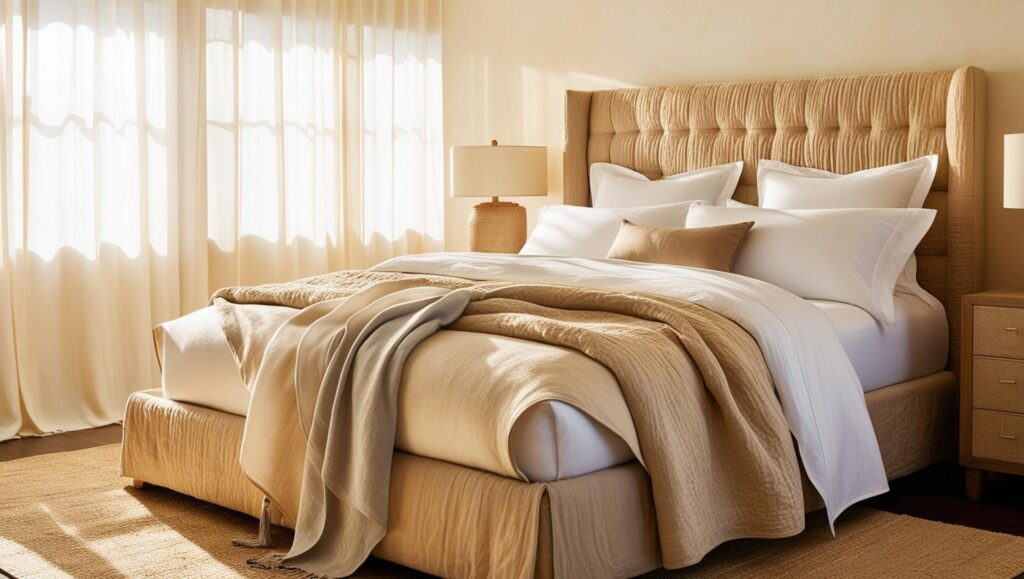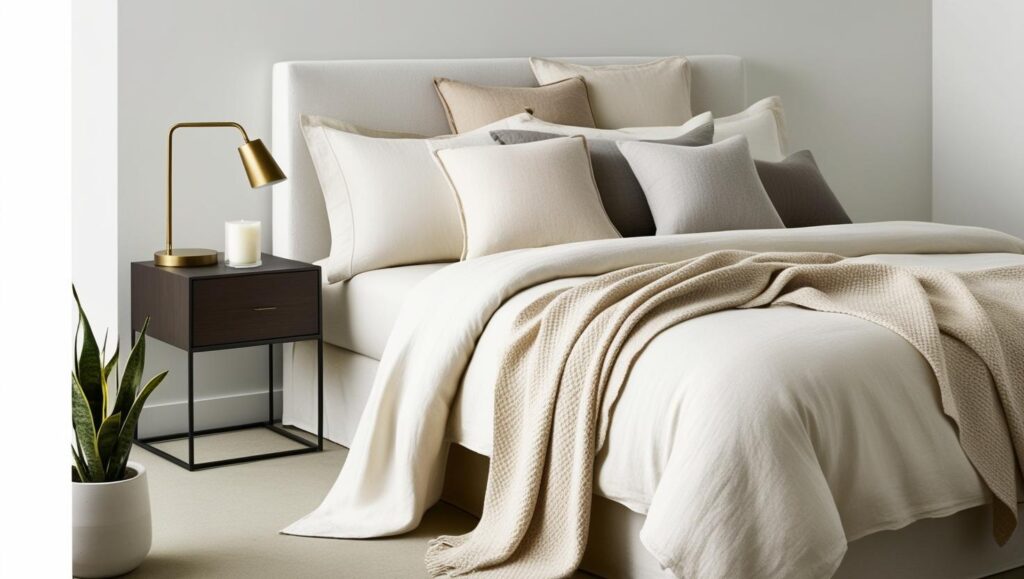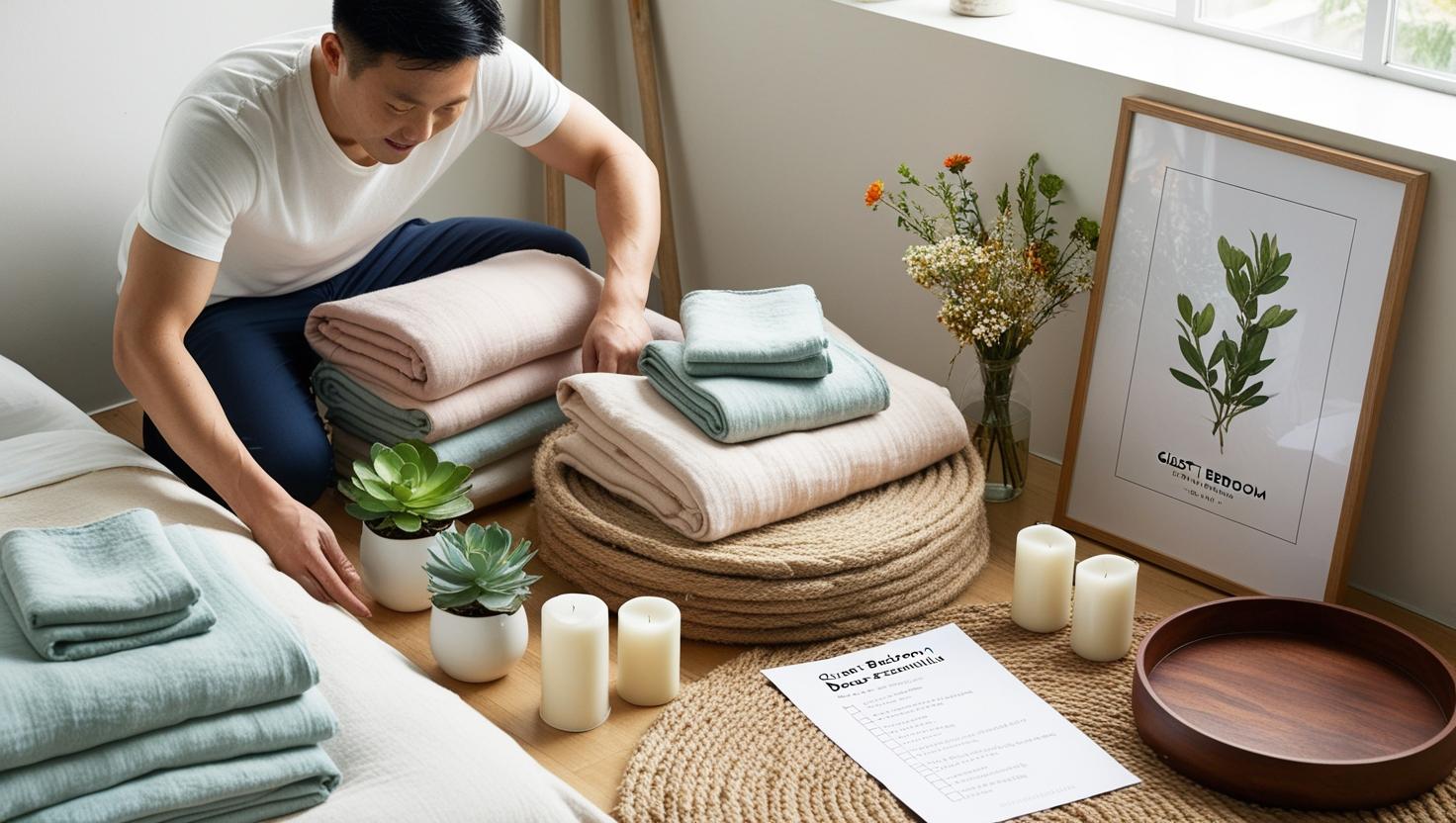Guest Bedroom Decor Ideas
Guest bedroom decor can transform your spare room into a cozy, stylish space that leaves guests feeling truly welcome and relaxed. Whether you’re working with a compact room or an entire suite, this guide to guest bedroom decor will help you design with comfort and style in mind. A well-planned guest space can serve as both a warm retreat and a reflection of your hospitality—giving visitors a memorable, home-away-from-home experience.
Key Takeaways
- Comfort-focused design makes guests feel at home by prioritizing soft textures, cozy bedding, and thoughtful details
- Blending style with practicality ensures that the space looks good while serving everyday needs like storage and lighting
- Personal touches and cleanliness elevate the stay from functional to memorable
- Multi-functional furniture maximizes smaller rooms and offers flexibility for various guest needs
- Lighting and privacy upgrades ensure restful sleep, no matter the time of day
Start with a Cozy Bed Setup
Nothing sets the tone for your guest bedroom like the bed itself. Start with a medium-firm mattress that offers broad comfort across sleep styles. Top it with breathable cotton or bamboo sheets—these materials wick moisture and feel soft against the skin. Add pillows of varying firmness, a plush duvet, and a cozy knit or sherpa throw at the foot of the bed. Layering textures is key to both comfort and visual appeal.
For structural elegance, space-saving bed frames such as modern platform beds or foldable daybeds work well in compact spaces. Want to add a personal touch? Choose bedding in neutral tones and accent with seasonal colors or prints.

Wrap-up: The right bed setup doesn’t just offer sleep—it creates comfort, calm, and a sense of thoughtful care that guests will notice immediately.
Make the Space Stylish and Practical
Your guest bedroom should look like an extension of your home, not an afterthought. Start with a calming color palette—soft neutrals like taupe, sage, or blush provide a spa-like foundation. Complement with textures from throw pillows, rugs, or wall art to add interest.
Decor elements like framed prints, sculptural mirrors, or ceramic wall hangings introduce personality. Consider adding handmade or reclaimed furniture for warmth. Functionality matters too: include a bedside table with a lamp, clock, and phone charger so guests can easily settle in.
Not sure how to strike the balance? Check out our bedroom rug designs to see how form meets function beautifully.

Wrap-up: With the right mix of comfort and style, your guest room can be both beautiful and highly usable.
Offer Storage with Style
Even if guests are only staying a few days, having somewhere to unpack can make a big difference. A slim dresser, stylish storage bench, or even a small wardrobe can make the space feel less temporary.
Try a multi-purpose ottoman at the foot of the bed—guests can stash bags inside or use it as a seat. Want to save floor space? Look into hidden storage beds that offer room for extra linens, pillows, or off-season clothing.
Wrap-up: When storage solutions match your decor style, they elevate both function and visual harmony.
Light the Room Thoughtfully
Lighting is one of the most overlooked parts of guest bedroom decor, but it can make or break the comfort level. Start with a soft overhead light on a dimmer. Add bedside lamps or wall sconces for reading, and try to offer both warm and cool light options.
Curtains should balance light filtering and privacy—layer sheers with blackout panels for flexibility. If your guest room gets morning sun, consider thermal blackout curtains that also help regulate temperature.
Explore more bedroom lighting ideas to help set the right tone.

Wrap-up: Thoughtful lighting creates ambiance and adaptability, helping guests feel comfortable at any time of day or night.
Add Thoughtful Personal Touches
It’s the little things that make guests feel genuinely welcome. Place a welcome card on the nightstand, provide a carafe of water with glasses, and include a mini guidebook with nearby restaurants or attractions.
If guests are staying for more than a night, leave a small basket with travel-size toiletries, snacks, or an extra phone charger. For a warm vibe, light a candle before their arrival or set out a few good books. These small gestures make a big impact and let guests know you care.
For more inspiration, Real Simple offers great tips.
Wrap-up: Personal touches speak louder than design—they make guests feel seen, valued, and cared for.
Keep It Fresh and Clean
Cleanliness can make or break the guest experience. Before your guest arrives, vacuum carpets, wash linens, dust surfaces, and clean the bathroom thoroughly. A freshly cleaned room signals hospitality and care.
Enhance freshness with a subtle scent—use a diffuser with lavender or eucalyptus oil, or place a small vase with fresh flowers. Avoid overpowering scents that might cause irritation. Keep a small bin for waste and extra tissues within easy reach.
Wrap-up: A clean and fresh guest room offers peace of mind and sets a high standard of comfort.
Don’t Skip the Decorative Touches
Decor adds the finishing touch. Include soft area rugs to warm up wood floors, or use peel-and-stick wallpaper to create an accent wall. Even small additions like potted plants or woven baskets can enhance the room’s vibe.
A few bold elements—like oversized artwork or a vintage mirror—can turn a simple room into a stylish retreat. Need more ideas? Explore House Beautiful’s guest room inspiration.
Wrap-up: Decorative elements don’t just enhance the look—they create mood and personality.
Prioritize Privacy and Comfort
Every guest appreciates privacy. Use blackout curtains or blinds for light control, and consider adding a white noise machine to help mask outside sounds. If your space has thin walls or is near a shared area, a privacy screen or heavier curtains can help.
Add climate control options like a small fan or space heater so guests can adjust their environment. An extra blanket or a cooling pillow can also boost comfort.
Check out Wirecutter’s expert guide for more comfort tips.
Wrap-up: Guests sleep better when they feel safe, comfortable, and in control of their environment.
Design a Multi-Functional Room
Your guest room doesn’t have to be a one-use space. Use a Murphy bed or a daybed that converts to a sofa during the day. A wall-mounted fold-down desk can create a quiet workspace when not in use.
If the space doubles as a hobby room or home gym, use attractive storage bins or cabinets to conceal items when guests arrive. The key is balance—design so the room can transition effortlessly between functions.
Wrap-up: A versatile room adapts to your needs while still feeling like a dedicated, cozy space for guests.
Sleep-Test It Yourself
The best way to evaluate your guest room is to spend a night in it. Try everything: lie on the bed, test the lighting, use the closet, and check for noise or awkward layouts.
This firsthand experience often reveals little issues—like a missing lamp or noisy floorboard—that you can easily fix. It also helps you understand what will help your guest feel relaxed and cared for.
Wrap-up: Walk in your guest’s shoes and you’ll uncover small improvements that make a big difference.
Creating a beautifully styled guest room doesn’t require a full renovation. With intentional decor choices, cozy bedding, and thoughtful details, your spare room can easily become a warm and inviting retreat for any visitor.
FAQ
- What should every guest bedroom have?
- A comfortable bed, fresh linens, good lighting, a place to store belongings, and thoughtful extras like water or a local guide.
- How can I make my guest bedroom more inviting?
- Use warm color schemes, cozy bedding, layered lighting, and personal touches like books, snacks, or a handwritten welcome note.
- How do I maximize a small guest bedroom?
- Opt for multifunctional furniture, vertical storage, and minimal decor to keep the space open and uncluttered. Use mirrors to create a sense of depth.







